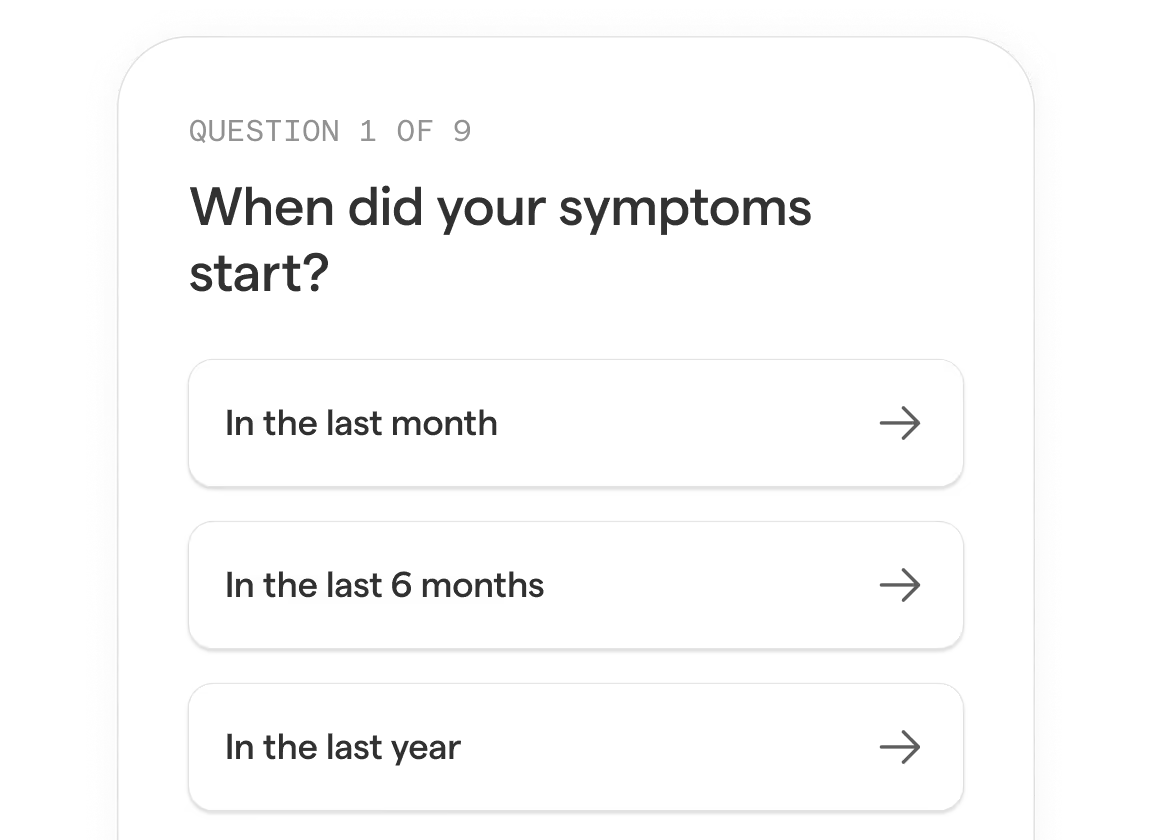Download the Felix App
Earn reward, visit our shop and get exclusive offers on the app
Download now

With Felix, you can get Lansoprazole prescribed by a licensed healthcare practitioner and delivered to your door for free.
Lansoprazole medications belong to the family of drugs known as Proton Pump Inhibitors (PPIs).
For those wondering, “what Lansoprazole is used for?”, they’re indicated for use in treating conditions where it’s required to lower the production of gastric acid secretion in your body.
If you’re curious about what other names Lansoprazole is sold under, NTP-Lansoprazole and Prevacid are the brand names of this medication, but its generic name is simply Lansoprazole. There are no other names Lansoprazole is sold under.
Do you want to learn more about prescription Lansoprazole uses, or how this medication functions? Click here to explore more information.
Lansoprazole medications work by affecting the lining of your stomach, causing it to produce less gastric acid during the digestion process.
It also assists with excess stomach acid building up, so that stomach acid doesn’t collect enough between/after meals to make its way back up into your esophagus, where it could cause damage.
There are a few different uses for Lansoprazole prescriptions, depending on what your practitioner believes could be your underlying condition. Lansoprazole uses include:
Lansoprazole dosages (15 or 30mg) are to be taken once daily, before breakfast.
In some cases, your practitioner may prescribe Lansoprazole doses for twice day use. In this case, you should take your Lansoprazole before breakfast, as well as another meal later in the day.
Always follow your clinician’s dosing schedule as accurately as possible, in order to achieve the best possible results from your Lansoprazole treatments.
If you miss a dose, take it as soon as you remember, unless it’s almost time for your next pill. In that case, skip the missed pill. NEVER double-up or take extra Lansoprazole medications without consulting your practitioner to ensure it’s safe.
The plasma-elimination halflife for Lansoprazole medications is only 2 hours, so if you’re curious about, “how long does Lansoprazole take to work?”, it provides some relief typically 1-2 hours after ingestion.
There is some significant improvement usually shown in 2-4 days of consistent use, and it becomes fully effective after 1-2 weeks, as your acid production is gradually reduced.
This is why for many patients, Lansoprazole is recommended for once-a-day treatments, in order to provide your body with a consistent, stable acid inhibitory effect.
For those with severe excess acid or symptom issues, practitioners may suggest twice-per-day dosing, in order to increase the acid inhibitory effects and help reduce symptom intensity.
SIDE NOTE: For clarification, the acid inhibitory effect that Lansoprazole dosages elicit from your body lasts 24 hours individually, but its effects compound over time with consistent use.
Most people that use Lansoprazole (15 or 30mg dosages) won’t experience any kind of side effects, or the side effects of their Lansoprazole prescription will be mild and may disappear or lessen over time.
With that in mind, the most common side effects of Lansoprazole include:
If any of these side effects of Lansoprazole become severe, be sure to let your practitioner know. They may be able to suggest alternative medications to Lansoprazole without interactions that cause negative side effects.
There are no commonly occurring serious side effects of Lansoprazole known at this time, but if you do start to experience any severe side effects with Lansoprazole, be sure to contact your practitioner right away.
They may want to adjust your dosage of Lansoprazole from 30mg to 15mg, or suggest a different treatment option that may work better for you.
Some people shouldn’t use Lansoprazole for GERD or acid reflux, as negative side effects or interactions could occur. These people include:
In addition, there are some people who should be extra cautious about using Lansoprazole prescriptions, including those who:
Your practitioner may want to suggest alternatives to Lansoprazole without interactions that could cause negative side effects.
There are certain medications that you shouldn’t take while using an online prescription for Lansoprazole in Canada. These medications may cause negative interactions with Lansoprazole.
To be safe, you should always let your practitioner know about any/all medications you’re taking, prior to requesting a new treatment. However, be extra sure to let your practitioner know before requesting Lansoprazole for GERD or acid reflux symptoms if you’re already taking:
Your practitioner may want to assign an alternative treatment option than Lansoprazole if you’re already taking one of these medications.
It has been shown that Lansoprazole medications do pass through to unborn children, as well as through breast milk during the breastfeeding process.
Because of this, it’s not recommended to use Lansoprazole in pregnancy or while breastfeeding, unless your practitioner deems the benefits to outweigh the risks that it could pose against an unborn or nursing child.
If you’re pregnant, planning to become pregnant, breastfeed, or planning to breastfeed, be sure to let your practitioner know, before requesting an online Lansoprazole prescription in Canada from Felix.
Further reading








The first step towards being able to request an online prescription for Lansoprazole in Canada with Felix is to complete your online assessment.
Our secure, chat-based online assessment system is easy-to-use, and it only takes a few minutes to get started. One of our licensed healthcare practitioners will typically get back to you within 24 hours of its submission.
If they believe that Lansoprazole medications could be a beneficial part of your treatment plan, they can provide you with a prescription for it. Plus, Felix’s pharmacy partners can deliver your Lansoprazole to you at no cost! All you need to pay for is the cost of your prescribed medications, as well as a small assessment fee.
We can even arrange for future Lansoprazole refills to be delivered, before you run out! This way, you’ll always have your Lansoprazole on-hand when you need it.
This question would be better asked to your personal insurance representative, because every provider and package will look somewhat differently, making it impossible for us to answer this question for everyone.
The good news is that if you do have coverage to get Lansoprazole online in Canada with Felix, we can bill your insurer directly for you and save you the time and trouble.
The same issue could be said for provincial health plans, because what’s available for coverage (under certain eligibility) in one province, may not be available in others.
You should check out your local government directory of medications that are covered, so that you can determine if you may have eligibility to get some covered. This way, your assigned clinician can help provide you with more information about how to apply for this coverage using your prescriptions with Felix.
It’s absolutely safe to order Lansoprazole online in Canada, when you choose to get your treatments from Felix.
The Felix Team is built on a foundation of expertise, experience, and accreditation. We offer treatments in a wide variety of areas. Our team of healthcare practitioners that offer uniquely valuable insights for patients experiencing those ailments.
Our pharmacy partners are licensed and registered to provide all of the medications, treatments, and testing tools we provide to our patients across Canada, and everything is delivered discreetly to your doorstep using Express Post.
Above all these reasons to trust Felix with your health, we’re constantly expanding our offerings to provide better tools, more services, and more experience, so we can continue evolving the telehealth support we’re providing Canadians.
There are plenty of reasons why you may want to choose to order an online Lansoprazole prescription in Canada with Felix.
Our secure, chat-based assessments offer you a private way to communicate with your assigned practitioner, in a judgement-free environment, from the comfort and ease of your own home.
Felix’s pharmacy partners work with us to help ensure we’re offering affordable treatment solutions for people across Canada, whether you’re looking for a Lansoprazole prescription, or another type of treatment.
We provide free delivery on all prescriptions that are purchased through Felix’s pharmacy partners, and we can even arrange for future Lansoprazole refills to be delivered ahead of needing them.
These are just a handful of the many ways that we’re helping people across Canada take back control of your health and quality of life. This way, you can get back to living life on your terms - the way it should be.
Felix is Canada’s first truly integrated healthcare platform. We provide on-demand treatment for everyday health needs like weight loss, mental health, sexual health, and more. Founded in 2019, our digital-first approach to healthcare includes everything from diagnosis to prescription — all accessible from the comfort of home.
No. Felix provides a faster, hassle-free way for you to get a treatment plan for certain conditions, but our service does not replace your primary care provider. For matters that extend beyond obtaining a lifestyle treatment safely and easily, we encourage you to consult your primary health practitioner in person — whether for checkups, personal health concerns, or to inform them about your current treatments or treatment plans.
Absolutely. Our online assessments have been designed to ask all the necessary questions required for diagnosis. We've worked with specialists to create an assessment process that can provide sufficient information for the healthcare practitioner to determine whether or not you are eligible for a prescription and craft an appropriate treatment plan.
Call 911 or proceed to your nearest emergency room immediately. Felix is not intended for medical emergencies. Once the emergency has been addressed or resolved, contact your prescribing practitioner to inform them of your experience as this may impact your current treatment plan.
Anyone who is 18 years or older (16 or older for acne and birth control prescriptions), and is located in Alberta, British Columbia, Manitoba, Newfoundland and Labrador, Nova Scotia, Prince Edward Island, Saskatchewan or Ontario. We cannot ship treatments outside of these provinces at this time.
After creating an account, you will complete a medical assessment for evaluation by one of the Felix healthcare practitioners.
During your assessment, you will have the opportunity to send your practitioner questions via secure messaging.
In most cases, practitioners will complete your assessment with secure messaging alone but sometimes they may determine you require an audio or video visit and/or further diagnostic testing to help determine the best treatment plan for you.
If your practitioner has determined a prescription treatment is appropriate, they will approve your visit and write you a prescription. Our pharmacy will then ship your prescription to your home.
You’ll be able to message your healthcare practitioner if you have questions or want to make changes to your treatment at any time.
No. We use an asynchronous telemedicine model so you can complete your online visit in your own time and we save your progress so you can come back later to finish it.
If you are completing a visit in the mental health or weight loss categories, your healthcare practitioner may require a phone or video call to discuss your medical profile further during the assessment process.
Most assessments do not require a phone or video conversation. Once a prescriber has reviewed the info in your assessment they will respond to you via secure instant messages that you can access within your Felix account.
If you are completing a visit in the mental health or weight loss categories, your healthcare practitioner may require a phone or video call to discuss your medical profile further during the assessment process.
You can expect to receive a response from a healthcare practitioner within 24 hours of submission. If you’ve been waiting longer than this, please reach out to our Patient Support team through the chat bubble in the bottom right corner of your account or our Contact Us page.
No. A visit with a licensed healthcare practitioner is required for all treatments currently provided through Felix’s service.
Not long. After completing your assessment, a practitioner will generally respond within 24 hours, and often much sooner.
Treatment plans will be processed within 2-4 business days of your approval date if there is nothing blocking fulfillment.
All packages usually takes 2-3 business days. You will receive an email with your tracking number once your treatment has been shipped.
Absolutely. All Felix shipments arrive in a nondescript blister package so you can have your treatment shipped wherever makes sense for you as long as there is someone there to sign for it.
A signature upon delivery may be required.
There is currently no cost to have your treatment shipped to you from our Felix Pharmacy network.
Yes, your security is paramount to Felix’s mission. Personal health information provided during your medical assessment is strictly and legally confidential between you and the Felix healthcare practitioner.
Beyond that, all your account information (including the medical assessment, credit card, and shipping information, etc.) is also stored safely and securely. Felix is compliant with all federal and provincial health privacy legislation. It is our duty to protect your data with comprehensive security infrastructure and stringent data policies to ensure it stays private and secure.
Read more on our Privacy Policy.
Yes! In Canada, only a licensed healthcare practitioner can write a prescription, and only a registered pharmacist can fill that prescription. We are supported by leaders in the Canadian pharmacology and specialized medical fields. Felix adheres strictly to all the regulations set forth by all applicable Colleges of Pharmacists and Colleges of Physicians and Surgeons in which we operate.
Absolutely. All prescriptions obtained via Felix are provided by licensed Canadian healthcare practitioners—the same as you would get at a hospital, doctor’s office, or clinic. These practitioners do not provide prescriptions unless they deem it medically safe and appropriate to write them based on your medical profile and assessment answers. Our assessments have been crafted by the practitioners on our medical team. Finally, all Felix Pharmacies are provincially accredited just like any retail pharmacy.
Your privacy is our top priority. All your data is 256 bit SSL/TLS encrypted, and we take significant steps to keep your data secure. You can read our Privacy Policy for more information.
Felix charges a fee for the online visit. In most cases the fee is $40 but varies by treatment category. The visit fee includes a prescription valid for up to a year (depending on the condition) and on-going support from the healthcare practitioner or pharmacist.
It depends. Treatment costs vary but will be in line with what you would pay at a pharmacy in person. You will see the estimated cost of your treatment before insurance, during the online visit but will only be billed for medication costs for your prescription once it is approved and sent to our pharmacy. Once approved, your treatment and payment will be processed within one to two days.
Keep in mind that you won’t necessarily need to pay the full price yourself. If you have insurance, Felix’s partner pharmacies will bill your insurer directly. You may also be eligible for financial support in your province.
We accept all major credit cards for any aspect of your treatment not covered by insurance or other financial support
Treatment coverage varies greatly between different insurance plans.
The good news is that if you are covered, Felix can bill your insurer directly, and then process your treatment plan at no additional cost to you. We recommend that you upload your private and/or provincial benefit card during the online visit so that our pharmacy partner can apply any coverage you are eligible for before processing your treatment plan.
Insurance coverage for treatment plans through Felix doesn't include the cost of your visit.
A Felix online visit is considered asynchronous since it is conveniently completed through a secure chat bases system. Currently, asynchronous visits are not covered by insurance or provincial health plans so you will be charged a visit fee, depending on the category of treatment you are requesting.
Medication coverage varies greatly between different plans, provinces, and has specific criteria that determine eligibility. For private insurance, we recommend contacting your benefits administrator with your details and the Drug Identification Number (DIN) and the drug name to determine your coverage.
For more details on provincial health plan coverage see below:
Alberta: Learn more about AHCIP here. Search for covered drugs here.
British Columbia: Learn more about MSP here. Search for covered drugs here.
Manitoba: Learn more about MHSIP here. Search for covered drugs here.
Newfoundland and Labrador: Learn more about MCP here. Search for covered drugs here.
Nova Scotia: Learn more about MSI here. Search for covered drugs here.
Ontario: Learn more about OHIP+ here. Search for covered drugs here.
Prince Edward Island: Learn more about Health PEI here. Search for covered drugs here.
Saskatchewan: Learn more about Saskatchewan Health Coverage here. Search for covered drugs here.












